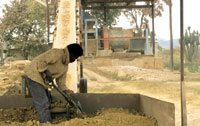Harsh socio-economic conditions in Zimbabwe are pushing many to migrate in search of work so that they can better provide for their families. But the dreams of those migrating can easily turn into living nightmares because of corruption. Leeroy’s (names have been changed) story is one such example.
Eager to find work, Leeroy told us how he had responded to an advertisement calling for professionals in the electrical, plumbing and carpentry field to work in Angola. He said that the recruitment company – a foreign owned firm – helped process the visas for him, and five of his colleagues, enabling them to emigrate to Angola.

photo: kevinzim
After working in Angola for a month, Leeroy says he and his colleagues were suddenly informed by their employer that they had not been issued working visas, but humanitarian ones. Apparently the recruitment firm had told Leeroy that Zimbabweans are poor and would work for free food and accommodation instead of a salary.
Far away from home and without an income, it is easy to see how many people become trapped in a cycle of dependency – becoming homeless and jobless if they reject their working arrangements. In fact, Leeroy and his colleagues only managed to get back home after the intervention of the Zimbabwean embassy in Angola.
On their return to Zimbabwe they came to Transparency International – Zimbabwe’s Advocacy and Legal Advice Centre, told their story and asked how to lodge a complaint against the recruitment company.
The centre was able to help Leeroy and his colleagues file a complaint against the recruitment company with the Chief Immigration Officer. They called for an investigation to be carried out to uncover how and why the firm had been allowed to operate their “recruitment” scheme so freely, without authorities taking a closer look at their processes and operations.
The centre also helped Leeroy and his colleagues launch a criminal complaint, which set in motion an investigation into how the recruitment company obtained visas for potential emigrants.
The head of the company was brought in for questioning and the matter is currently before the courts. Leeroy and his colleagues told us that they were happy to see the case being taken up by the justice system.
Through the International Organisation for Migration, Leeroy and his colleagues received grants to help start a business and are now earning an income, enabling them to look after their families. A lucky escape for them, but many others are not so fortunate.















 Connect with us on Facebook
Connect with us on Facebook Follow us on Twitter
Follow us on Twitter